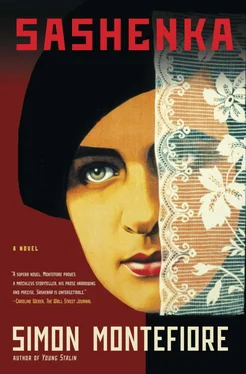“I worked for Lenin.”
“Do you think I care about that now? If you deceived Comrade Lenin, you’ll be doubly damned.”
“He called me Comrade Snowfox. He himself knew my background and he told me he came from nobility—it didn’t matter because I was a real Bolshevik believer.”
“How dare you soil Comrade Lenin! Don’t you realize where you are? Don’t you realize what you are now? You’re as good as dust! You are sitting before the Tribunal of the Revolution: the Cheka. Just answer my questions.” He looked down at the file, massaging the paper, round and round. “How long have you known Mendel Barmakid?”
“He’s my uncle. All my life.”
“Do you believe he’s a good Communist?”
“I have always thought so.”
“You sound like you have doubts?”
“I know he’s been arrested.”
“So you know we don’t arrest people for nothing?”
“Comrade Mogilchuk, I believe in the armed wing of the Party. I believe you Chekists are, as Dzerzhinsky said, the knights of the Revolution. My own husband—”
“Accused Palitsyn. Do you think he’s such a paragon of Party-mindedness? Really? Search your memories, your conversations: was he ever really an honest Chekist?”
“Yes, he was.” Suddenly she questioned even that: what if Vanya was a Fascist spy?
“And Mendel? He was never a real Communist, was he…Comrade Snowfox”—he added with a sneer—“if I may call you that?”
“An honest Bolshevik who served five exiles, imprisonment in the Trubetskoy Bastion, ruined his health in hard labor and never joined a single deviation or opposition…”
Mogilchuk removed his glasses. Without them, he was blearily myopic. He rubbed his face and ran his hands over his red hair. She sensed how eager he was to deliver her confession to his superior. Maybe he’d impress Beria. Perhaps even the Instantzia—Comrade Stalin himself—would hear of this ardent young investigator? He replaced his glasses. “Lift Mendel’s mask, show us this jackal and disarm him for us!”
“I don’t know anything,” she said. “Mendel! I’m trying to think…”
“Think and tell me!” Mogilchuk raised his pen. “You speak and I’ll write. Did Mendel ever mention the Japanese diplomat he met in Paris?”
“No.”
“The English lord who visited the embassy in London?”
“No.”
“What foreigners did he know? Did he ever ask you to meet them? Think—scour your mind!”
So it was Uncle Mendel they wanted! Sashenka knew it was not her. They’d invited Gideon to the Lubianka to talk about Mendel. Then Vanya had been pulled into this: perhaps someone had overheard Mendel and Vanya arguing about jazz? And, through Vanya: her. Benya was clearly unconnected to Mendel. Except via her—but that was much too tenuous. No, Benya was part of something else, the case against the intellectuals—and Mogilchuk hadn’t mentioned him at all. What was clear, though, was that they needed her to denounce Mendel.
So it was Mendel who had brought this disaster upon her: it was he who had taken her children away. The mother in her was happy to sacrifice Mendel in a moment: she would do anything to see her children again. But if she invented the fact that Mendel was a Japanese spy, would they see that she was innocent and had loyally served the Party?
She went back to Vanya’s instructions: “If they’re creating a case against Mendel, they’ll want your testimony, but remember he converted you and me to Marxism, introduced us both to the Party—and each other! That confession will destroy us all! Wait until we know what they have against us.”
The investigator checked his hairdo again. “Well?”
“No, Mendel’s a decent comrade.”
“And you yourself have nothing to tell me?”
She shook her head, feeling exhausted and weak. But there was hope, she told herself. Like someone buried in a landslide, she thought there was a way through to a chink of light. Vanya would not confess either; and even if her darling Vanya was destined for the meat grinder, there was no case against her. Vanya, like any father, would die easier if he knew his wife was safe with their children! Be strong, confess nothing—and you will see Snowy and Carlo again, she told herself. After all, this had been polite enough. Perhaps they were just fishing…
“All right, you want to play games with us?” said Mogilchuk quite calmly. “You must realize, Comrade Snowfox, that I’m an intellectual like you are, like your uncle Gideon. You may have seen my stories published under the name M. Sluzhba? Well, I just like to talk to people. That’s my way. I’ve given you every chance but you’re going to get a nasty surprise if you don’t start to talk.” He picked up the Bakelite phone and dialed a number. “It’s Mogilchuk…No, she won’t…Right!” He replaced the phone. “Come with me.”
Accompanied by a guard, Investigator Mogilchuk led Sashenka down a long passageway that she had never seen before, up some steps, across the covered bridge, down some steps, and they emerged onto a wide corridor with a parquet floor. It was lined with gleaming panels of Karelian pine, portraits and busts of early Chekist heroes, and silken banners. A blue carpet ran down the center, held in place with chunky gold tacks. Guards in ceremonial NKVD uniform stood beside a Soviet flag and a life-sized statue of Dzerzhinsky. The corridor ended in imposing double doors of oak. A guard opened them.
They entered an anteroom where two NKVD officers, probably from the regions, sat with their briefcases. Mogilchuk walked straight through a further set of double doors, which were opened by another guard. Inside, Sashenka recognized instantly the bustling apparat of a Soviet potentate: many secretaries in white blouses and grey skirts, eager young men in Party tunics, lines of Bakelite phones, piles of papki files, and green palms. A young officer jumped up and led them to a third closed door. He knocked and opened it.
“Investigator Mogilchuk?”
They entered an airy and bright office of monumental proportions, gleaming parquet and Karelian pine, smelling of polish and cool forests. To the left, some sofas and soft chairs were set on Persian carpets. Over the mantelpiece hung a huge oil painting by Gerasimov of Comrade Stalin, and in the corner sat a steel safe taller than a man. Marble busts of Lenin and Dzerzhinsky stood on each side of the room and, so far away that Sashenka could barely see it, another Gerasimov loomed, this time of Dzerzhinsky, Iron Felix, the founder of the Cheka, with his insane eyes and goatee.
In the middle of the room, a polished oak desk was attached to a conference table to form the T shape common to every office in the USSR. It was in pristine order, with a silver desk set, inkwells of turquoise ink, and only one or two pieces of paper on the blotter. The table behind the desk boasted eight telephones—and the vertushka Kremlin line. And presiding over it all, on a high-backed velvet burgundy chair, sat Comrade Lavrenti Pavlovich Beria, Narkom of the People’s Commissariat of Internal Affairs.
Beria was eating from a plate of what appeared to be spinach or salad leaves. He beckoned her into the room with an open palm, masticating energetically.
Mogilchuk saluted and left the room.
“Oh Lavrenti Pavlovich,” Sashenka said, “I’m so pleased to see you! Now we can clear this up.”
Beria swallowed his mouthful then stood up courteously, walked round the desk and kissed her hand. “Welcome, Alexandra Samuilovna,” he said formally in his rich Mingrelian accent, still holding her hand between his silky fingers. “You’re wondering what I’m eating?”
“Yes,” she said, though she did not give a damn what he was eating.
Читать дальше












